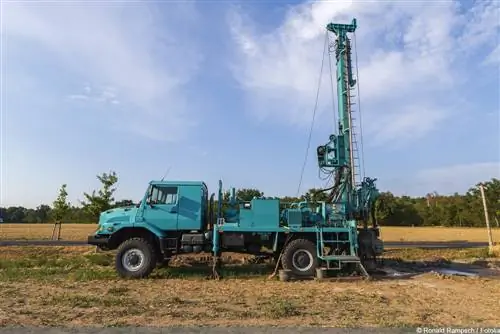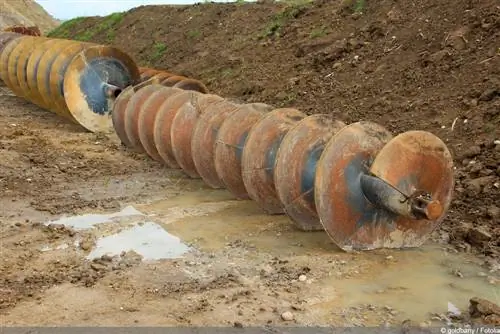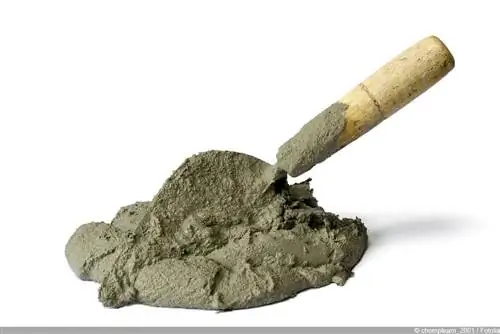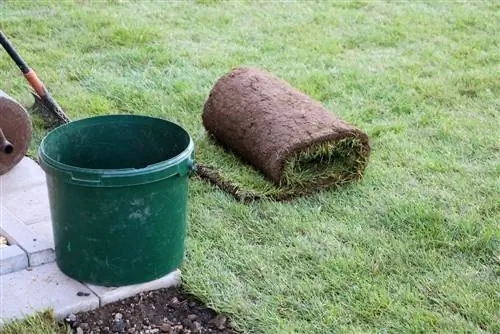- Author admin caroline@plants-knowledge.com.
- Public 2023-12-17 03:39.
- Last modified 2025-01-24 12:45.
In summer you can't usually do without watering your garden. It is of course an advantage if you can draw water from your own well and thus save on fees. However, whether the well is really worth it depends not least on what it costs to have it drilled. It should also be clear to you that every well is generally subject to registration.
Basics
Water can be taken free of charge from a so-called aquifer underground via a well. In order for this to work in your own garden, such a ladder must first be available - and an access, i.e. a well, must be created from above. Three types can be distinguished:
- Shaft well, in which a shaft is dug into which the groundwater can then seep in
- Borewell, in which a hole is drilled into which a pipeline is then inserted to the aquifer
- Dam well, in which a pipe is mechanically driven into the ground up to the aquifer
Anyone who decides to have their own well in the garden today will usually use a drilled or rammed well. Only these two types of wells guarantee a sufficient and rapid water supply. The groundwater is pumped upwards by a mechanical or electrical pump. If you want to water your lawn directly from the well, you can't avoid an electric pump. Basically, it should be clear to you that the water from such a well is not of drinking water quality and can only be used for watering. As a rule, a specialist company must be commissioned to drill wells. Theoretically, you can build a ramming well yourself, but special tools are required.
Costs
General information on costs is generally difficult. They depend on various factors. These factors include, for example, the condition of the soil. A soil with a lot of clay requires significantly more work, which also means that higher costs are associated with it. In soil that is mostly sandy, however, drilling is much easier and therefore more cost-effective. In addition, the region in which you live also plays a role in calculating costs. Above all, however, it usually depends on the depth that needs to be drilled. If no flat rate price could be agreed, the billing will be in meters.
Flat and meter prices
It is of course ideal if a flat rate price could be agreed with the company that drills the well. This price then includes all costs, regardless of how deep the drilling had to be done. Specialist companies are willing to accept such flat-rate offers if it is clear from the outset that the effort will be within certain limits. The costs are usually in the range of 600 to 800 euros.
Tip:
The company that is supposed to drill the well must have seen the site beforehand during an on-site visit. Only then can it make a reliable statement about the expected costs.
If a flat rate billing is not possible, the costs depend on the depth. Normally, you have to drill around seven to eight meters deep to access enough groundwater for garden irrigation. Depending on the region, the costs for this are on average around 60 euros per meter. Of course, it is often necessary to drill much deeper. One then speaks of a so-called deep well. Because this requires significantly more effort, the costs also rise. You can assume that such a deep drilling costs around 120 euros per meter.
Note:
All information on costs should only be understood as a rough guide.
Requirement to register

Every well that is drilled in Germany is generally subject to registration. This means that the municipality in which you live must be notified that you plan to build a well. This can be done informally in writing. The report must contain information about the origin of the water and its use. If you do not comply with the report, you are committing an administrative offense. Registration must usually take place before drilling work begins and is usually not subject to a fee. In principle, it is also advisable to contact the municipal or city administration before taking the measure, as special regulations may exist from municipality to municipality. By the way, official approval is not required for a conventional garden fountain. However, after registration, the authorities may prohibit the construction of a well.
Permit requirement
If the well is not just intended to provide water for the garden, but also drinking water, a permit is required. In addition to the municipality, the responsible he alth department is also involved. The crucial factor here is the water quality. In order to determine this, complex analyzes and an on-site visit are usually necessary. The permit is usually refused if the water is unsuitable for drinking due to poor quality.






